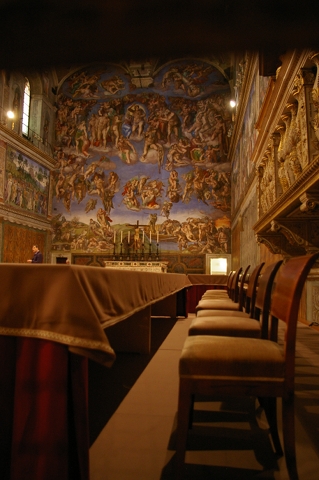
The cardinals will deliberate from these chairs inside the Sistine Chapel over who will be the next pope. They will be flanked by Michelangelo's painting of the last judgment, seen in the background. (NCR photo/Joshua J. McElwee)
On Monday, the day before the cardinals begin casting their ballots for the next pope, the focus was on the rituals involved in the conclave process, including what the smoke announcing the new pope's election will look like.
The Vatican painted the picture at a press briefing, explaining that the cardinals would begin casting ballots Tuesday afternoon after an hourlong procession involving long scarlet robes, reading of an oath of secrecy complete with laying of hands on the Bible, and singing of the "Veni Creator Spiritus."
The cardinals will process Tuesday as they enter the ornate, Renaissance-era Sistine Chapel for the conclave. They will start the day Tuesday with a special Mass in St. Peter's Basilica dedicated to the election.
On Monday, 152 cardinals met at the last of 10 general congregations of the group since Pope Benedict XVI's resignation Feb. 28.
Speculation since the resignation has focused on what the cardinals are discussing at those meetings, whether any of their number have emerged as front-runners for the papacy, and what issues have been considered central to the next pontificate.
The Vatican said Monday there were 161 speeches, known as interventions, by the cardinals during the meetings. Among the issues discussed Monday morning was the Institute for Works of Religion, known as the Vatican Bank, which has been subject to international probes over its financial transactions and transparency.
One theme that ran through all 28 of Monday's interventions was "the expectations and hope for the new pope," said Basilian Fr. Thomas Rosica.
Rosica, who has been providing English translation at the briefings, said such a profile "has been addressed throughout the congregations but this morning was addressed particularly," and a more refined profile is emerging.
Those assisting in the conclave -- about 90 people who will drive the cardinals to and from the Sistine Chapel, act as confessors, and tend to their needs at a special Vatican hotel during the event -- are to take a solemn oath of secrecy Monday afternoon. Should they break the oath, they face a penalty of automatic excommunication.
Tuesday's morning Mass will be in Latin. Cardinal Angelo Sodano, the dean of the College of Cardinals, will be the presider and homilist. His homily is expected to be of particular significance: When Cardinal Joseph Ratzinger gave the homily at the Mass before the last conclave in 2005, many said his remarks contributed to his election as Pope Benedict XVI the next day.
Following the Mass, the cardinals will have their procession, then will likely cast one ballot for the next pontiff. They are not expected to agree on a candidate at that point and will likely re-enter the Sistine Chapel on Wednesday morning, casting two votes in the morning and two in the afternoon if needed.
A two-thirds majority -- 77 cardinals of the 115 who will vote -- is needed for election as pope.
Among the readings chosen specifically for the Tuesday Mass -- the cardinals will not use the normal Lenten readings for the day -- are portions of Paul's letter to the Ephesians and the Gospel of John.
The reading from Ephesians, taking from its fourth chapter, focuses on the role of Christians in the Body of Christ. Some are given the gift of apostleship, it says; some, prophetic ministry; some evangelization; some pastorship.
"If we live by the truth and in love, we shall grow in all ways into Christ, who is the head by whom the whole body is fitted and joined together," it reads.
The Gospel, taken from the 15th chapter, presents Jesus laying down the greatest commandment -- "love one another as I have loved you" -- before the Lord gets down to specifics.
"I have made known to you everything I have learnt from the Father," Christ says, according to the Gospel. "You did not choose me; no, I chose you; and I commissioned you to go out and to bear fruit, fruit that will last."
"The Father will give you anything you ask him in my name," Christ continues, according to the account. "What I command you is to love one another."
Some of the cardinals might recall that assurance as they place their ballots in an urn used just for the occasion this week.
[Joshua J. McElwee is an NCR staff writer. His email address is jmcelwee@ncronline.org. Follow him on Twitter at twitter.com/joshjmac.]


